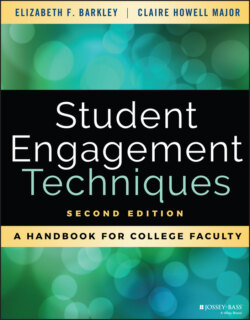Читать книгу Student Engagement Techniques - Elizabeth F. Barkley - Страница 46
Context and Degree of Original Learning
ОглавлениеEmotional associations can have a particularly potent influence on transfer, as emotions usually have a higher priority than cognitive processing for commanding our attention. Words such as “abortion,” “torture,” and “terrorist” often evoke strong emotional responses. Math anxiety—the fear and tension that interferes with some students' ability to manipulate numbers or solve mathematical problems—is an example of the association of a negative feeling with a content area. Students with math anxiety will try to avoid situations involving math in order to spare themselves the negative feelings associated with it. In contrast, people will devote hours on hobbies because of the feelings of pleasure and satisfaction they associate with these activities (Sousa, 2006, p 145).
Not surprisingly, the quality of the original learning also strongly influences the quality of transfer to new learning. If the original learning was thorough, deep, and accurate, its influence will be much more constructive than learning that was originally superficial. At the college level, we work with the cumulative “prior learning” of K–12, over which we have little control. Because we have greater control over what students learn when they are with us in college (especially at the department/degree level), we should take extra care to help students connect positive feelings to new learnings and ensure that foundational material is taught well, as everything that is learned in these courses becomes the basis for future transfer.
